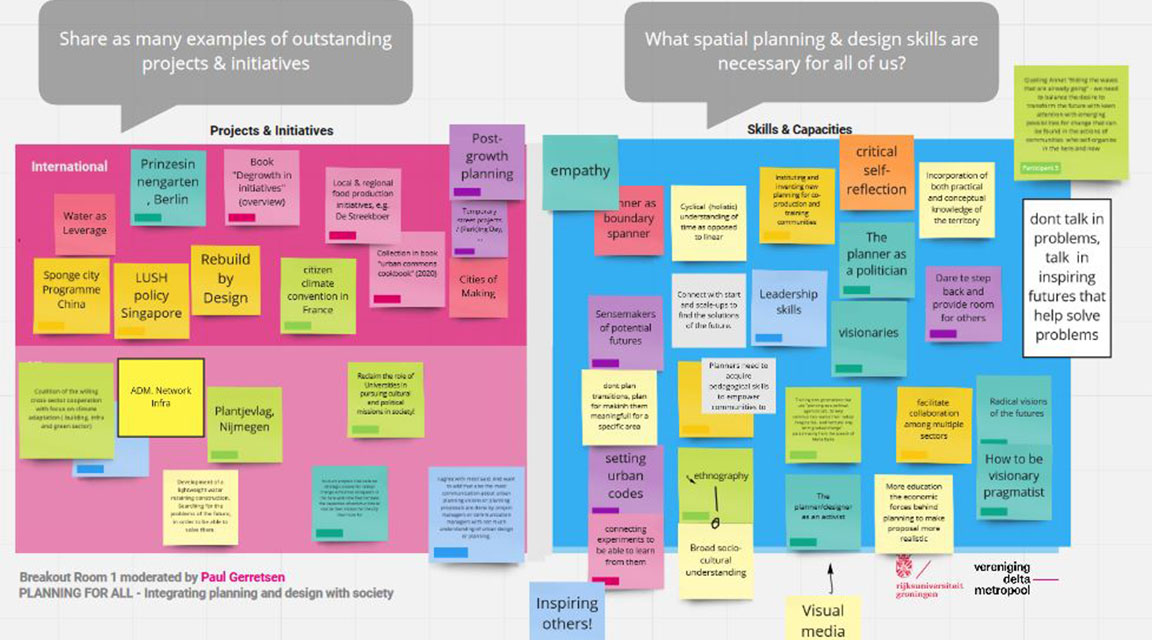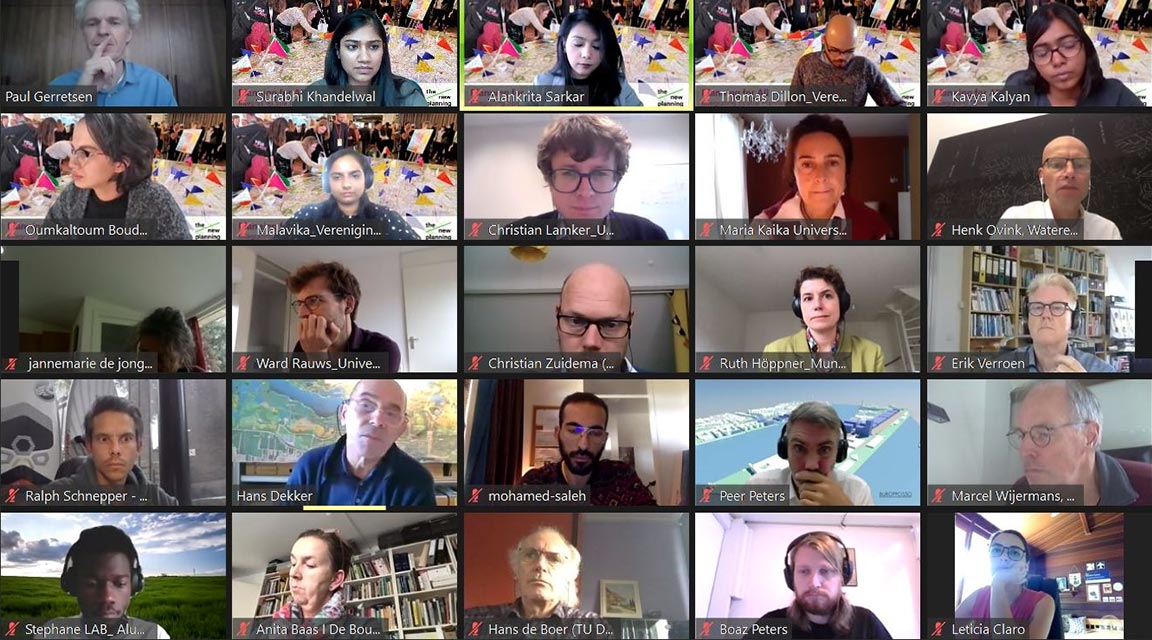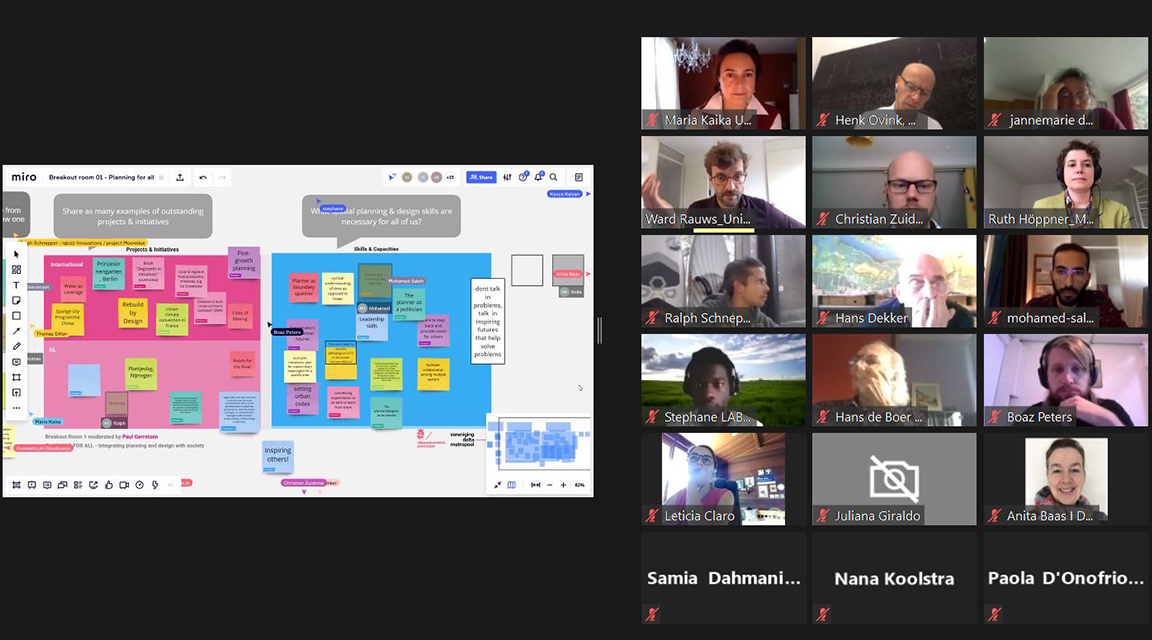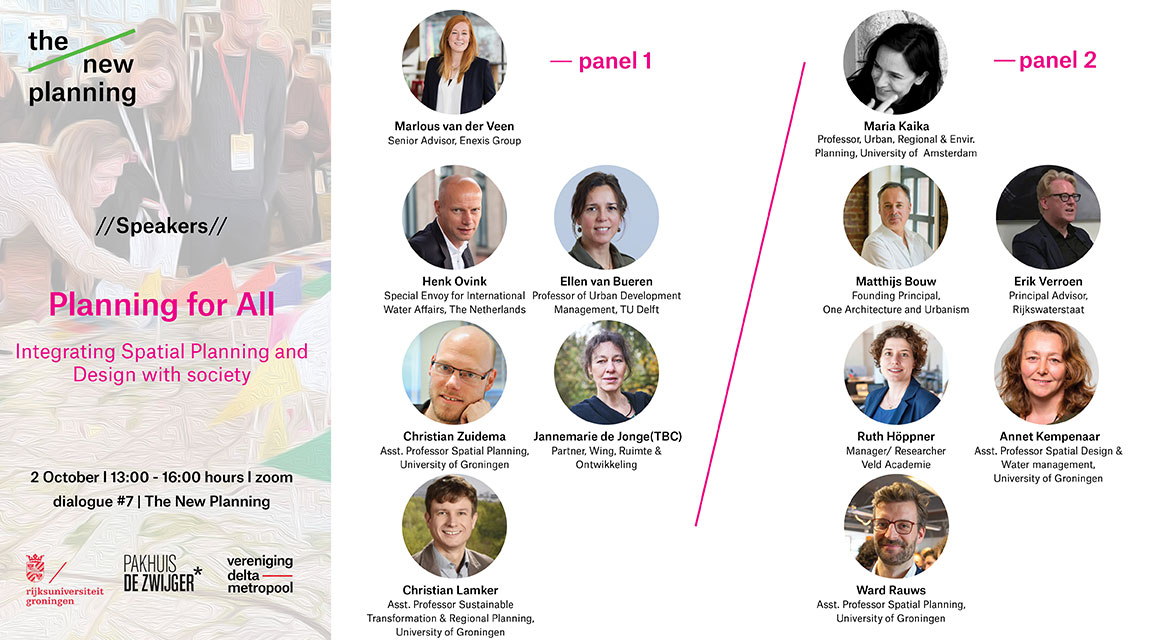Planning as a radical political act in the current framework!
Reporting back - Planning for all
16 november 2020
This reporting back article highlights some of the important discussions and results from 'The New Planning Dialogue #07', organised as a debate by Deltametropolis Association in collaboration with University of Groningen and Pakhuis De Zwijger.
Watch full video of the event here
Planning for all – The seventh activity of the The New Planning Dialogue, as a digital session was focused on the repositioning of the spatial planner or designer as an orchestrator and enabler of sustainable regional futures. Earlier planned as a live meeting at Pakhuis de Zwijger was later shifted to a fully digital session due to the ongoing pandemic restrictions. With this slight change, the digital debate was successfully organised with two exclusive panel discussions on topics; (1) changing roles of planners and planning systems and (2) skills and competences that are crucial for planners of tomorrow.
Introduction
‘We need to do better things instead of doing things better’, as Jannemarie de Jong (partner, Wing) put forth during the discussion, this statement sums up the need to rethink the current ways in which planning systems are organised. The New Planning Dialogue #7 focused on the topic of the role of planners and designers and how they need to reposition themselves and acquire new skills to address the challenges that we face today. With some inspiring, conflicting and visionary ideas, we hosted approximately 65 planners and urban thinkers from Netherlands and Europe in search of appropriate, necessary fundamental modifications in planning systems. A lot of our speakers posed their own practicing challenges and certain ways to look into the future of planning.
The session was introduced by Paul Gerretsen (Director, Deltametropolis Association) with the motivating question/quote from Rem Koolhaas, ‘Whatever happened to Urbanism? (Rem Koolhaas, 1995)’. Indeed, this question seems to be very relevant even today as we see spatial planning being absent and planners not fully equipped with the relevant skills and capacities to tackle the challenges that’s in front of us.
“Planning skills and capacities should be made available for all. it should be shared as a quality with much bigger societal player”
— Paul Gerretsen (Deltametropolis Association)
Panel 1: Changing roles of planning systems and planners
Predictions on climate change, population growth and ecological deterioration urge us to act faster and more radically than ever before and calls for integrative and inclusive planning for all! What changes and big transitions in planning should be there taking into consideration the challenges we face today such as the climate change, the current crisis and so on, particularly in the Netherlands? With this very important yet highly complex question, we started the first panel discussion with Marlous van der Veen (Enexis Group), Ellen van Buren (TU Delft), Henk Ovink (Rebuild by Design), Christian Zuidema (RUG), Christian Lamker (RUG) and Jannemarie de Jonge (Wing), moderated by Paul Gerretsen (Deltametropolis Association).
This led to an interesting discussion and some critical points from our speakers, starting with Dr.Zuiderma stating that it is important to think in an integrated fashion and understand that planners play a big role in connecting the challenges and finding a common ground. He also pointed out that we need more guts and leadership from the domain of planning, to move towards a leading role instead of a constraining role.
“The biggest capacity of planners is to think in an integrated fashion; how does everything connect to each other? Who could translate the visions? Planners play a big role”.
— Christian Zuidema (University of Groningen)
Ellen van Bueren (TU Delft) reminded us that it is our responsibility to act now. She talked about the need to think long term and have the vision to realise the ambitions and targets that we must achieve. She also criticises that planners are too much in sync with the policy makers, as we look forward to markets to prompt the change while it is us who should open the discussions. She poignantly asks, are we making the right choices at the moment?
“There is a schizophrenia when it comes to realising the targets. Everybody is aware of the goals but there are too many reasons why it can’t happen. Planner need to take action”.
— Ellen van Bueren (TU Delft)
Henk Ovink (Rebuild by Deisgn) and Christian Lamker (RUG) both pointed out the institutional and political constraints that planning today faces. They reiterated that it is critically important to address the societal challenges through the various tools of communication rather than just ‘cherry-picking’ values from the UN’s Sustainable Development Goals.
“Overcoming vested interests is crucial for overcoming future challenges”.
— Henk Ovink (Special Envoy for International Water Affairs, the Netherlands)
“Make visions captivating enough to change the mindsets and approaches across the different scales. Planning is a deeply political process”.
— Christian Lamker (Assistant Professor, University of Groningen)
Marlous Van der Veen (Enexis Group) talked about her experience from practice with planning often being a hurdle as it cannot keep up with the demands to realise. She says beyond pilot, if you talk about changing regulations, the conversation stops. Henk also pointed out that many a times we take risks only with the ‘pilot project’ but pilots does not have transformative capacity. We need to make sure pilot project becomes a driver for change.
“In practice, I relate to planning being a hurdle. Spatial planning cannot keep up with the demands and the realization times”.
— Marlous Van der Veen (Enexis Group)
Through this discussion we realised that there is a huge gap between instrumental planning and strategic planning, as pointed out by Jannemarie de Jong (Wing). She remarked that we need to have a ‘pilot mindset’ to approach practice as a continuous pilot as a new standard of doing better things.
“We need a pilot mindset. We need to see this continuous pilot as a new standard and doing better things, instead of doing things better”
— Jannemarie de Jong (Partner, Wing).
Panel 2: Skills and capacities of planners and designers
The second panel looked at the (re)new(ed) position in terms of the skills and competences that are crucial for planners of tomorrow in connecting to a multitude of actors and stakeholders. In conversation with Ward Rauws (University of Groningen), Maria Kaika (University of Amsterdam), Erik Verroen (Rijkswaterstaat), Matthijs Bouw (One architecture), Ruth Hoppner (Veld Academie) and Annet Kempenaar (University of Groningen) and moderated by Paul Gerretsen (Deltametropolis Association), focused on the question of how planners need to re-educate themselves and in what ways can we do that.
Ward Rauws started the debate by pointing out the high level of complexity and interdependency to develop adapt and deal with uncertainty. He also suggested that planners should facilitate more flexibility and temporality in design and to cleverly think on how to use our tools for guiding and setting conditions.
“The role of planners to facilitate more flexibility and temporality in design”.
— Ward Rauws (Assistant Professor, University of Groningen)
Bringing us back to the point that planning should be political, Maria Kaika with her powerful statements urged us dare to reset our training. While pointing out that we cannot wait for the future, she asks, ‘What can possibly be more risky than the situation that we are in today?’. She takes a critical stand by saying planning should instead focus on practices of dissent, capture radical imaginaries and institutionalise them. That rather than calling our incompetencies as resilience, we should dare to fail, and fail better.
‘Planning should fail better; Let’s dare to do that’
— Prof. Maria Kaika (Professor, University of Amsterdam)
Matthijs Bouw, a practising architect also shared his concerns in which planning takes place today, the neo-liberal model, as he pointed out that there is a gap in strategic thinking and operational planning.
“Real solutions might not be spatial at all. Netherlands is the only place in the world that doesn’t look for advice outside of the country”.
— Matthijs Bouw (Founder, One Architecture)
While Erik Verron talked about taking practical steps to bridge this gap through new forms of thinking, in financing and more organic planning concepts.
“We are far more in a battle of space than in connecting the dots”.
— Erik Verroen (Advisor, Rijkswaterstaat)
Citing examples from her practice, Ruth Hoppner pointed that a lot of planners in the field currently are not planners at all. She talked about the importance of involving communities and teaching them to plan as this is a helpful process of real planning. Annet Kempenaar also agreed to this statement as she reflected on the panel.
We often think in terms of conflict. But people start to realise how they can assist and can inspire each other.
— Ruth Hoppner (Manager, Veld Academie)
There is an urge for diversity in planning. Planning should provide assistance and support to communities.
— Annet Kempenaar (Assistant Professor, University of Groningen)
Conclusion
Terry van Dijk (University of Groningen) concluded the session by reflecting on the panel discussion and providing insights into the intention of organising this event. He talked about the massive challenges that we face today and the fact that it is not enough to just talk about problems, but it is time to act and take it as our responsibility to share images of an inspiring future. He hoped that this discussion be a wake-up call to start building on sensible things and creating a sense of shared responsibility.
“We have to light the beacon and must take responsibility for helping society to make images as to where to go to”.
— Terry van Dijk (Assistant Professor, University of Groningen)
Results
We are working on reports and papers on each subject that can be combined together in a publication format at the end of The New Planning Dialogue. The publication “The New Planning Cookbook” will showcase the results and process of the dialogue. The expected outcome will provide a new model, a co-created framework for city planning. This will act as a support to put research into practice, with the creation of an efficient working method with the involved practitioners.
Thank you to all the participants for joining us online and a special thank you to the collaborators that made the online session possible, our speakers as well as from team Deltametropool, Paul Gerretsen, Alankrita Sarkar and Malavika Krishnan and volunteers Thomas Dillon, Kavya Kalyan, Surabhi Khandelwal and Oumkaltoum Boudeya for their contribution.
Join the dialogue to opinionate, influence and revolutionize the planning model and support the project by your eminent participation.
Follow the link to know more about the project and connect to us .



